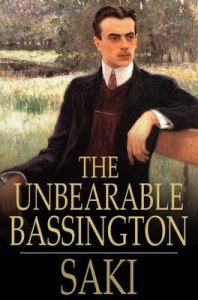H.H. Munro (Saki)
There is an anonymous quote floating around the internet that runs something along the lines of:
Should you ever see a man reading Saki on public transport you should do everything in your power to marry him before the next stop.
I like that quote. And in part, I like it because the quote itself sort of captures the wry humour of the writer in question.
We don’t know why H.H. Munro adopted the pen name Saki, but that is the name you will mostly find his work published under. Best known for his short stories in which mischievous, trickster persons poke fun at Edwardian social mores whilst sometimes brushing up against dark, mystical and weird preternatural things, he wrote with humour, wit and a twisted, bleak opinion of people in general and spinster aunts in particular (perhaps unsurprisingly Munro was raised by his spinster aunts).
The Unbearable Bassignton is one of H.H. Munro’s few novels. It is short, barely a slip of a thing, about the same length as say The Portrait of Dorian Grey, which I suspect would make an interesting companion work to read before or after. But whereas Munro’s short stories tend to have strong elements of the supernatural (or at least foolish and uptight Edwardian’s mistaking something for the supernatural), The Unbearable Bassignton has only the barest hint of anything supernatural: there is a brief suggestion of a ghostly dog, which is based on a traditional death-omen from Munro’s own family history.
And where the characters in Munro’s short stories dance and cavort through the pages, gleefully extracting the urine, in The Unbearable Bassington, the titular character may still be something of a witty trickster and outsider, but he is also more of a tragic figure. Perhaps this is what drove Munro to produce a longer work. Comus Bassington was based on a friend of Munro’s who was driven by unbending family expectations and wilful lack of sympathy to an early death. Fair warning then, The Unbearable Bassington is a tragedy, but I haven’t spoiled it for you. Knowing that this work is a tragedy is like knowing that Hamlet is a tragedy before seeing it performed whilst knowing nothing else. It is the journey that astounds.
If you haven’t read any Saki, or perhaps if you once tried to read his work but were put off by the supernatural, fantastical elements (uncanny weirdness is not be everyone’s cup of tea), then The Unbearable Bassington is both a good introduction to Munro’s general style and a highly readable novel in more of a conventional literary casting.
I won’t say anything too much about the final twist of Munro’s plot-knife, or the final fate of Bassington, or for that matter his mother’s prized Old Master hanging on the wall. Suffice to say the story feels both irrevocable in its destination and darkly humoured in its view of human nature. The book adjudges a harsh sort of final assessment of the characters left behind once Bassington meets his unavoidable fate and we are left with a feeling that this is Munro’s own last pronouncement upon the family that he saw as responsible for his friend’s early death.
And yet this is somehow not a depressing story. It is not uplifting exactly, but it has wit, humour and charm: and in a strange way we do come away with a feeling that the Comus Bassington of the title leaves behind a life he lived well, albeit a short one danced to his own tune, to his own destruction.



I like ‘extracting the urine’, though it must perplex our brothers and sisters outside the Commonwealth